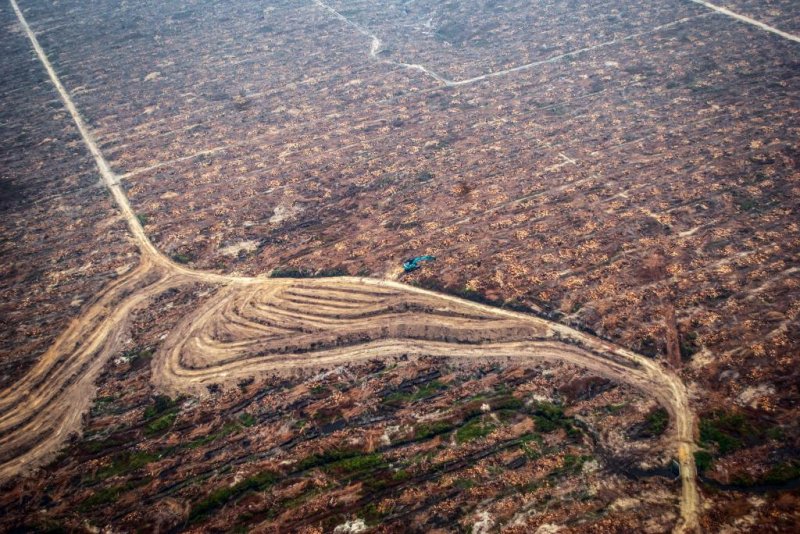In Indonesia and across Southeast Asia, forests and national parklands are burnt and cleared to make way for expanding palm oil plantations. Photo by Rony Muharrman/European Pressphoto Agency
March 27 (UPI) -- Most climate science focuses on the atmosphere and the ocean, but a new report puts the health of Earth's land front and center -- and the diagnosis isn't good.
According to the first-ever land health report, produced by scientists with the Intergovernmental Science-Policy Platform on Biodiversity and Ecosystem Services, or IPBES, some 75 percent of the planet's land areas are significantly degraded. The land's ill health threatens billions of people and the ecosystem services those people rely on.
Researchers blame the decline in land health on a combination of the usual suspects, including unsustainable farming, mining, industrial pollution and climate change. According to the study, the accelerating expansion of farm and grazing lands, driven by unsustainable management practices, is the largest driver of land degradation.
"With negative impacts on the well-being of at least 3.2 billion people, the degradation of the Earth's land surface through human activities is pushing the planet towards a sixth mass species extinction," Robert Scholes, assessment co-chair, said in a news release. "Avoiding, reducing and reversing this problem, and restoring degraded land, is an urgent priority to protect the biodiversity and ecosystem services vital to all life on Earth and to ensure human well-being."
With growing population demands fueling the expansion of cropland and fossil fuel extraction, scientists expect the problems affecting land health to worsen in the decades ahead -- unless drastic policy changes are made.
As much as 95 percent of the planet's land areas could become degraded by 2050, if trends continue, researchers predict.
Land degradation robs the ability of Earth's land to provide valuable services, including food and water security. The majority of the world's population now faces threats to the availability of clean drinking water. Declining land health is also driving a loss of biodiversity across the planet.
The new report was approved this week by IPBES members in Colombia. It was compiled by 100 leading experts, including climate scientists, environmental scientists, planetary scientists, biologists and ecologists, from 45 countries.
"Through this report, the global community of experts has delivered a frank and urgent warning, with clear options to address dire environmental damage," said Sir Robert Watson, chair of IPBES. "Land degradation, biodiversity loss and climate change are three different faces of the same central challenge: the increasingly dangerous impact of our choices on the health of our natural environment. We cannot afford to tackle any one of these three threats in isolation -- they each deserve the highest policy priority and must be addressed together."
The good news is that efforts to promote sustainability and control the expansion of cropland and grazing lands can have dramatic effects. According to the report's authors, the benefits of preventing land degradation far outweighs the costs of protection and management.
The report offers a number of specific solutions, including: increased efforts to reduce soil loss and replenish soil health, combined with more sustainable agriculture practices. Authors of the report also recommend replanting native species, re-flooding dried wetlands, improving wastewater treatment and boosting green infrastructure.
"Fully deploying the toolbox of proven ways to stop and reverse land degradation is not only vital to ensure food security, reduce climate change and protect biodiversity," said co-chair of the assessment Luca Montanarella. "It's also economically prudent and increasingly urgent."















